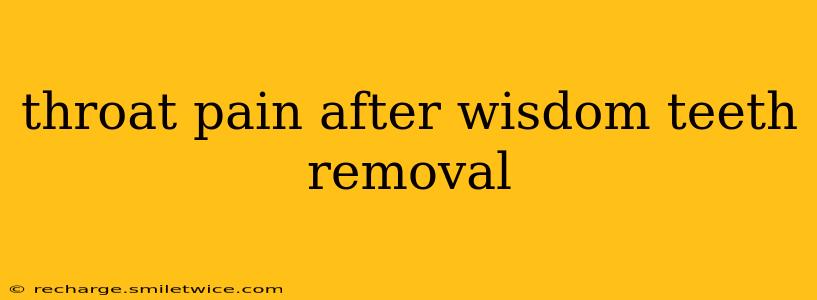Having your wisdom teeth removed is a common procedure, but recovery isn't always smooth sailing. Many patients experience throat pain following the extraction, and understanding why this happens and how to manage it is crucial for a comfortable recovery. This comprehensive guide will delve into the causes of post-wisdom tooth removal throat pain, effective remedies, and when you should seek professional medical attention.
What Causes Throat Pain After Wisdom Teeth Removal?
Throat pain after wisdom teeth extraction is a relatively common complication. Several factors contribute to this discomfort:
-
Swelling: The surgical site swells significantly after the procedure. This swelling can extend to the throat and surrounding tissues, causing irritation and pain. The pressure from the swelling can also make swallowing difficult and painful.
-
Irritation from the Surgery: The surgical instruments used during the extraction process can cause minor irritation to the throat, especially if the procedure was complex. Stitches, if used, can also contribute to this discomfort.
-
Dry Socket: While not directly causing throat pain, a dry socket (alveolar osteitis), a complication where the blood clot at the extraction site dislodges, can indirectly contribute. The exposed bone can cause significant pain in the jaw, which can radiate to the throat area, particularly when swallowing.
-
Medication Side Effects: Some pain medications, particularly those containing codeine, can cause dry mouth, which in turn can lead to a scratchy or sore throat.
-
Post-Nasal Drip: Swelling and inflammation can disrupt normal drainage, leading to post-nasal drip, irritating the throat.
-
Infection: In rare cases, infection can develop at the extraction site. This can lead to more severe throat pain, along with other symptoms like fever, chills, and increased swelling.
How to Relieve Throat Pain After Wisdom Teeth Removal
Managing throat pain after wisdom teeth removal involves several strategies:
-
Saltwater Rinses: Gently rinsing your mouth with warm saltwater several times a day can help clean the surgical site and reduce inflammation.
-
Ice Packs: Applying ice packs to your jaw can help reduce swelling, which can alleviate throat pain. Remember to wrap the ice pack in a thin cloth to prevent direct contact with your skin.
-
Over-the-Counter Pain Relievers: Non-steroidal anti-inflammatory drugs (NSAIDs) like ibuprofen can effectively manage pain and reduce inflammation. Always follow the dosage instructions on the label.
-
Rest: Adequate rest is essential for proper healing. Avoid strenuous activities and get plenty of sleep.
-
Soft Foods: Stick to soft, easy-to-swallow foods like soups, mashed potatoes, yogurt, and applesauce. Avoid anything that requires excessive chewing.
-
Hydration: Staying well-hydrated is crucial for healing and helps prevent dry mouth, which can exacerbate throat pain. Sip water frequently throughout the day.
When to See a Doctor After Wisdom Teeth Removal
While some throat pain is normal after wisdom teeth removal, certain signs warrant immediate medical attention:
-
Severe, Uncontrolled Pain: If your throat pain is intense and doesn't respond to over-the-counter pain relievers, consult your dentist or oral surgeon immediately.
-
High Fever: A high fever (above 101°F or 38.3°C) could indicate an infection. Seek medical attention without delay.
-
Excessive Swelling: If swelling is significant and progressively worsening, contact your dental professional.
-
Difficulty Breathing or Swallowing: These symptoms could indicate a serious complication and require urgent medical intervention.
-
Signs of Dry Socket: Severe pain starting 2-3 days after the surgery, along with a visible empty socket, suggests a dry socket. Contact your dentist immediately.
How Long Does Throat Pain Last After Wisdom Teeth Removal?
The duration of throat pain varies from person to person. Most patients experience some discomfort for a few days to a week. However, persistent or worsening pain should be addressed promptly by your dentist or oral surgeon. If pain continues for longer than a week, or if you experience any of the warning signs mentioned above, seek professional medical advice.
Can I Use Mouthwash After Wisdom Teeth Removal?
The use of mouthwash following wisdom teeth extraction is generally discouraged, especially immediately after the procedure. However, your dentist or oral surgeon might recommend a specific mouthwash as part of your post-operative care instructions, usually starting several days after the extraction. Always follow their advice.
This information is for general knowledge and does not constitute medical advice. Always consult with your dentist or oral surgeon regarding any concerns about your post-operative recovery. They can provide personalized advice and address any specific issues you may be experiencing.
